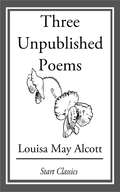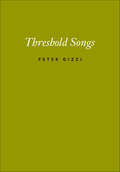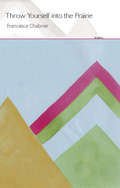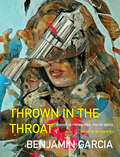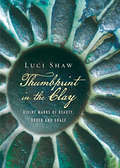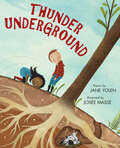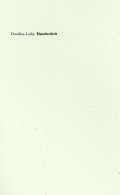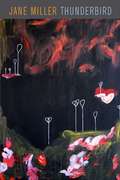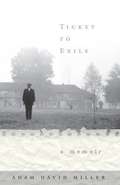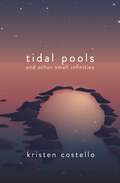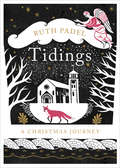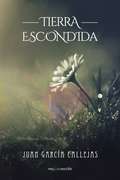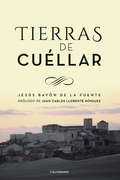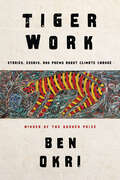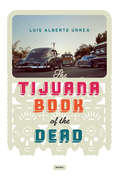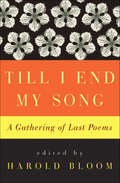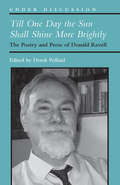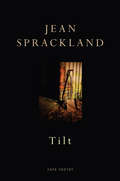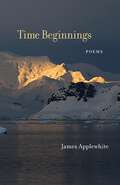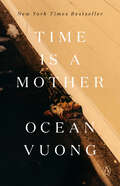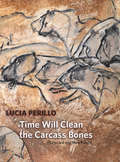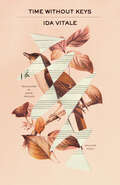- Table View
- List View
Three Unpublished Poems
by Louisa May AlcottLouisa May Alcott (November 29, 1832 - March 6, 1888) was an American novelist best known as author of the novel Little Women and its sequels Little Men and Jo's Boys.
Three by Tsvetaeva
by Marina TsvetaevaThree of the legendary Russian dissident writer's greatest poems, two autobiographical and one based on a Russian folktale, now in a new, invigorating English translation. Three by Tsvetaeva collects three dazzling and devastating reckonings with love and the end of love by a poet celebrated for the unequaled verbal inventiveness and emotional intensity of her work. &“Backstreets,&” translated into English for the first time, is a retelling of a Russian fairy tale that offers a witches&’ brew of temptation, bodily transformation, marriage, and murder. &“Poem of the Mountain&” and &“Poem of the End,&” perhaps the most celebrated of Marina Tsvetaeva&’s poetic sequences, explore the shifting dynamics of a love affair. The voices of the lovers, the voice of the narrator, and the voice of poetry combine and recombine, circle each other and split, engaging the reader in a constantly shifting spectrum of emotion, from unbridled passion to rawest grief, and discovering at last a strange triumph in loss. Andrew Davis&’s translations of Tsvetaeva bring out the wild brilliance of an incomparable artist.
Threshold Songs (Wesleyan Poetry Series)
by Peter GizziAbout Threshold Songs, the voices in these poems perform at the interior thresholds encountered each day, where we negotiate the unfathomable proximities of knowing and not knowing, the gulf of seeing and feeling, the uncanny relation of grief to joy, and the borderless nature of selfhood and tradition. Both conceptual and haunted, these poems explore the asymmetry of the body's chemistry and its effects on expression and form. The poems in Threshold Songs tune us to the microtonal music of speaking and being spoken. Check for the online reader's companion at http://petergizzi.site.wesleyan.edu.
Through Many Windows
by Arthur GordonShort stories. Don't be afraid to feel love, joy, romance, sorrow, fear. Arthur Gordon uniquely ties these emotional stories together with autobiographical sketches that reveal his own thoughts about each episode. These stories will enchant, entertain, and enlighten you because they bring new insights and new interpretations to everyday situations. Every member of your family will want to return to these tales again and again. Take a long look "Through Many Windows." You'll discover that your life will be brightened by the light of hope.
Throw Yourself into the Prairie
by Francesca ChabrierFrancesca Chabrier's poems hold on to the possibility that the sorrowing parts of our lives may be transformed. The collection offers loose, sensuous, gentle associations, combined the interplay of comic and coy images. A debut of remarkable freshness and delight, through which syntactic innovation yields new meaning. Chabrier's poems entertain, startle, cast a spell, and bless.
Thrown in the Throat
by Benjamin Garcia&“An unabashed celebration of complexity in queerness and gender, an arresting snapshot of survival and a triumphant reclamation of language.&” —Shelf Awareness (starred review) &“Tongues make mistakes / and mistakes / make languages.&” And Benjamin Garcia makes a stunning debut with Thrown in the Throat. In a sex-positive incantation that retextures what it is to write a queer life amidst troubled times, Garcia writes boldly of citizenship, family, and Adam Rippon&’s butt. Detailing a childhood spent undocumented, one speaker recalls nights when &“because we cannot sleep / we dream with open eyes.&” Garcia delves with both English and Spanish into how one survives a country&’s long love affair with anti-immigrant cruelty. Rendering a family working to the very end to hold each other, he writes the kind of family you both survive and survive with. With language that arrives equal parts regal and raucous, Thrown in the Throat shines brilliant with sweat and an iridescent voice. &“Sometimes even a diamond was once alive&” writes Garcia in a collection that National Poetry Series judge Kazim Ali says &“has deadly superpowers.&” And indeed these poems arrive to our hands through touch-me-nots and the slight cruelty of mothers, through closets both real and metaphorical. These are poems complex, unabashed, and needed as survival. Garcia&’s debut is nothing less than exactly the ode our history and present and our future call for: brash and unmistakably alive. &“Angry, tender, and resounding with the speech of flowers, birds, and diamonds, every syllable carries a glorious charge.&” —The Boston Globe, &“Best Books of 2020&” &“Electrifying . . . explores unrepentant sexual desire, interrogates fraught familial relationships, and examines our troubled cultural moment.&” —Lambda Literary
Thumbprint in the Clay: Divine Marks of Beauty, Order and Grace
by Luci Shaw"The thumbprint . . . is for me a singular clue to human identity. . . . Just as each human thumbprint is unique, its pattern inscribed on the work of our hands and minds, the Creator's is even more so—the original thumbprints on the universe," declares poet Luci Shaw. We worship an endlessly creative God whose thumbprints are reflected everywhere we look—in sunsets, mountains, ocean waves—and in the invisible rhythms that shape our lives, such as the movement of planets around the sun. And this creative and ever-creating God has also left indelible thumbprints on us. We reflect God's imprint most clearly, perhaps, in our own creating and appreciation for beauty. A longing for beauty is inherent to being human. We don't create things that are purely practical; we desire them to be aesthetically pleasing as well. Beauty is also powerful, in its redemptiveness, generosity, inspiration. In reflecting on the role of beauty in our lives, Luci Shaw writes, "Beauty is Love taking form in human lives and the works of their hands." So come, join Luci Shaw as she ponders through the beauty of poetry and prose the places, sometimes unexpected, where she encounters God's fingerprints, and let it help you learn to see them in your life as well.
Thunder Underground
by Jane YolenIn this collection of poems, noted children's poet Jane Yolen takes readers on an expedition underground, exploring everything from animal burrows and human creations, like subways, near the surface—to ancient cities and fossils, lower down—to caves, magma, and Earth's tectonic plates, deeper still below our feet. At the same time, in Josée Masse's rich art, a girl and boy, accompanied by several animals, go on a fantastic underground journey. This book contains science, poetry, and an adventure story all rolled into one. But it's also more than that: In these poems we see that beneath us are the past, present, future—history, truth, and story. This thought-provoking collection will evoke a sense of wonder and awe in readers, as they discover the mysterious world underneath us.
Thunderbird
by Dorothea Lasky"In lines that remind me of the way William Carlos Williams insisted that only the imagination gives us access to reality, Lasky's poems evoke a practice of living, as bloody and awful and lovely as living can ever be."-Julia Bloch, Bitch"The beautiful thing about Lasky, in all her work, but particularly here, is her ability to create that same sense of earnestness, the sense that she is telling you a secret."-InDigest Magazine, InDigest PicksGo, brave and gentle reader, with Dorothea Lasky to the "purple motel / where the bird lives." Go with her, as you have willingly gone down the dark passages before, with her bare-faced poems for guidance. Thunderbird's controlled rage plunges into the black interior armed with nothing but guts and Lasky's own fiery heart to light the way.Baby of airYou rose into the mysticalSide of thingsYou could no longer live with usWe put you in a little homeWhere they shut and locked the doorAnd at nightYou blew outAnd went wandering . . . Dorothea Lasky is also the author of Black Life and AWE, both from Wave Books. She lives in New York.
Thunderbird
by Jane MillerOur childhood such a large cellar with no bulb.Jane Miller brings a painterly eye to the elegiac in an ambitiously linked sequence that explores ecstasy and desire, memory and loss, the ancient and the ultramodern. Suggesting the thunderbird of Native American lore as readily as modern American warfare, Thunderbird is a book of mourning and loss redeemed by the body and the mind.Jane Miller is the author of nine books of poetry, including A Palace of Pearls (Copper Canyon Press, 2005), which won the Audre Lorde Prize. Miller teaches at the University of Arizona and lives in Tucson, Arizona.
Ticket to Exile: A Memoir
by Adam David MillerAt age nineteen, A.D. Miller sat in a jail cell. His crime? He passed a white girl a note that read, ''I would like to get to know you better.'' For this he was accused of attempted rape. Ticket to Exile recounts Miller's coming-of-age in Depression-era Orangeburg, South Carolina. Miller reconstructs the sights, sounds and social complexities of the pre-civil rights South, and his youth as a closet rebel who successfully evaded the worst strictures of a racially segregated small town. By the time he is forced into exile, we realize that this fate was inevitable for a young man too intelligent and aware of the limitations of his society to remain there without disastrous consequences.
Tickets for a Prayer Wheel
by Annie DillardCelebrate re-publication of this Pulitzer Prize-winning author's first book of poems.
Tidal Pools and Other Small Infinities
by Kristen Costello"You'll walk away with more gratitude for the slow burn of the healing process." — Alicia Cook, author of Sorry I Haven&’t Texted You BackTidal Pools and Other Small Infinities blurs the lines between endings and beginnings. The love story starts in the usual way: a whirlwind of confessions, late night conversations, and promises that seem sturdy. The years pass by, and novelty is replaced by a comforting routine – one that&’s difficult to walk away from when things take a toxic turn. This is a collection about bravery and evolution. It takes courage to leave behind the familiar. To question all the things that once seemed undeniably true. To learn to stand on your own and, in doing so, become who you were really meant to be. Endings can be the best beginnings…once you realize you have the power to create them.
Tierra escondida
by Juan García CallejasUn canto ante el asombro de la vida y una reflexión lírica de los recuerdos de la infancia, la experiencia, los viajes, los lugares, las despedidas. <P><P>Tierra escondida es un conjunto de poemas organizado en etapas distintas, como una especie de recorrido con trazas de diario donde el autor nos desvela, a través de los flecos sueltos de la memoria, y la experiencia, la senda del autoconocimiento y el conocimiento de la realidad que nos vive. <P><P>Este poemario es un canto ante el asombro de la vida, y una reflexión lírica de los recuerdos de la infancia, la experiencia, los viajes, los lugares, las despedidas.
Tierras de Cuéllar
by Jesús Bayón de la FuenteConoce la villa de Cuéllar, una isla de arte mudéjar en un Mar de pinares. En la provincia de Segovia, comunidad autónoma de Castilla y León. Las páginas de este libro de poemas, como su mismo título indica, discurren sobre unas tierras castellanas, que llenaron mi infancia, parte de mi juventud, mi madurez y mi senectud. Comienza con un poema sobre el río Cega que surca la tierra de pinares y los campos que pertenecen a la villa de Cuéllar. Continúa hablando, en términos poéticos, de lugares y vistas singulares de Cuéllar, sus torres, campanarios, castillo, arcos defensivos o de entrada, tanto a la ciudad como a la ciudadela, cubos defensivos, e iglesias o conventos; sin olvidar sus charcas, lomas, montes, alamedas, pinares y dehesas. Igualmente se componen poemas sobre sus más famosas fiestas -los encierros de toros- más antiguos de España; fiestas que ningún natural de Cuéllar desea faltar a ellas ni una sola vez ensu vida. Finaliza la obra con un poema sobre la muy insigne poetisa cuellarana doña Alfonsa de la Torre y Rojas. Entre las páginas de poesía se encuentran colocadas un sinfín de fotografías sobre monumentos, campos, árboles y otros lugares de estas tierras de Cuéllar.
Tiger Work: Poems, Stories and Essays About Climate Change
by Ben OkriIn this poignant, timely collection, the renowned Booker Prize–winning author evokes the magic of nature and the urgency of protecting our environment.Twenty thousand years after a catastrophe wiped out the human race, visitors uncover their final messages scattered across the planet, in flooded cities and disintegrating books. These writings reveal the tragedies of people who continued to live as they always did—fearfully, selfishly—even as the end of their world loomed. These haunting stories within a story, together with a powerful selection of poems, fables, and essays, are a necessary reminder of the beauty of the earth and the importance of addressing the climate crisis with clarity, artistry, and passion.
Tijuana Book of the Dead
by Luis Alberto UrreaFrom the author of Pulitzer-nominated The Devil's Highway and national bestseller The Hummingbird's Daughter comes an exquisitely composed collection of poetry on life at the border. Weaving English and Spanish languages as fluidly as he blends cultures of the southwest, Luis Urrea offers a tour of Tijuana, spanning from Skid Row, to the suburbs of East Los Angeles, to the stunning yet deadly Mojave Desert, to Mexico and the border fence itself. Mixing lyricism and colloquial voices, mysticism and the daily grind, Urrea explores duality and the concept of blurring borders in a melting pot society.
Till I End My Song: A Gathering of Last Poems
by Harold Bloom“A colossus among critics. . . . His enthusiasm for literature is a joyous intoxicant.” —New York TimesIn this charming anthology, esteemed literary critic Harold Bloom collects the last poems of history's most important and celebrated poets. As with his immensely popular Best Poems of the English Language, Bloom has carefully curated and annotated the final works of one hundred poets in Till I End My Song, with selections from John Keats, T.S. Eliot, Elizabeth Bishop, Emily Dickinson, Dylan Thomas, Robert Frost, D.H. Lawrence, W.H. Auden, John Milton, Herman Melville, Emily Brontë, and others. Written with the same wise and discerning commentary of earlier books—including his acclaimed Shakespeare: The Invention of the Human and The Book of J—Till I End My Song is a moving and provocative meditation on the relationship between art, meaning, and ultimately, death, from the literary titan of our time.
Till One Day the Sun Shall Shine More Brightly: The Poetry and Prose of Donald Revell (Under Discussion)
by Derek PollardSince the publication of From the Abandoned Cities in 1983, Donald Revell has been among the more consistent influencers in American poetry and poetics. Yet, his work has achieved the status it has—his honors include fellowships from the National Endowment for the Arts and the Guggenheim Foundation and awards from the PEN Center USA and American Poetry Review—in a manner that has often tended to belie its abiding significance. This collection of essays, reviews, and interviews is designed to ignite a more wide-ranging critical appraisal of Revell’s writing, from his fourteen collections of poems to his acclaimed translations of French symbolist and modernist poets to his artfully constructed literary criticism. Contributors such as Marjorie Perloff, Stephanie Burt, Dan Beachy-Quick, and Bruce Bond examine key elements in and across Revell’s work, from his visionary postmodernism (“Our words can never say the mystery of our meanings, but there they are: spoken and meaning worlds to us”) to his poetics of radical attention (“And so a poem has nothing to do with picking and choosing, with the mot juste and reflection in tranquility. It is a plain record of one’s entire presence”), in order to enlarge our understanding of how and why that work has come to occupy the place that it has in contemporary American letters.
Tilt
by Jean SpracklandJean Sprackland's third collection describes a world in free-fall. Chaos and calamity are at our shoulder, in the shape of fire and flood, ice-storm and hurricane; trains stand still, zoos are abandoned, migrating birds lose their way - all surfaces are unreliable, all territories unmapped. These are poems that explore the ambivalence and dark unease of slippage and collapse, but they also carry a powerful sense of the miraculous made manifest amongst the ordinary: the mating of natterjack toads, ice on the beach ('dream stuff, with its own internal acoustic') or 'the fund of life' in a used contraceptive. Bracken may run wild across the planet 'waiting for the moment/to pounce on the accident/of the discarded match' but there are also the significant wonders of children and the natural beauty of the world they've inherited. Tilt is a collection of raw, distressed and beautiful poems, a hymn to the remarkable survival of things in the face of threat - for every degradation an epiphany, for every drowning a birth.
Time Beginnings: Poems
by James ApplewhiteIn his poem “Afterward,” James Applewhite imagines a curious Eve in the Garden of Eden, her eye falling upon a twisting river and an S-shaped snake before she eats from the tree of knowledge, choosing change over stasis. Applewhite’s new collection Time Beginnings casts a keenly observant eye on the ever-varied natural world and meditates on the place of humans within it. In these philosophical poems, the slow creation of new planets in the farthest reaches of the galaxy mirrors the development of single-celled Earth organisms whose “first awareness . . . foretell[s] a consciousness / of self, the life lived knowing of death.”Meditating upon topics as far-ranging as the movement of photons in the heart of the sun and the single drop of blood on the finger of a girl holding a rosebud, James Applewhite’s poems explore deeply the mysteries of the galaxies and the complexities of being human.
Time Is a Mother
by Ocean Vuong"Take your time with these poems, and return to them often.&” —The Washington PostThe New York Times-bestselling collection of poems from the award-winning writer Ocean VuongHow else do we return to ourselves but to fold The page so it points to the good part In this deeply intimate second poetry collection, Ocean Vuong searches for life among the aftershocks of personal and social loss, embodying the paradox of sitting in grief while being determined to survive beyond it. Shifting through memory, and in concert with the themes of his novel On Earth We&’re Briefly Gorgeous, Vuong contends with the meaning of family and the cost of being the product of an American war in America. At once vivid, brave, and propulsive, these poems circle fragmented lives to find both restoration as well as the epicenter of the break. The author of the critically acclaimed poetry collection Night Sky with Exit Wounds, winner of the 2016 Whiting Award, the 2017 T. S. Eliot Prize, and a 2019 MacArthur fellowship, Vuong writes directly to our humanity without losing sight of the current moment. These poems represent a more innovative and daring experimentation with language and form, illuminating how the themes we perennially live in and question are truly inexhaustible. Bold and prescient, and a testament to tenderness in the face of violence, Time Is a Mother is a return and a forging forth all at once.
Time Will Clean the Carcass Bones: Selected and New Poems
by Lucia Perillo"Perillo's poetic persona is funny, tough, bold, smart, and righteous. A spellbinding storyteller and a poet who makes the demands of the form seem as natural as a handshake."--Booklist"The poems [are] taut, lucid, lyric, filled with complex emotional reflection while avoiding the usual difficulties of highbrow poetry."--The New York Times Book ReviewMacArthur Genius Award winner Lucia Perillo is a fearless poet who, with characteristic humor and incisive irony, confronts the failings and wonder of nature, particularly the frail and resilient human body. This generous collection draws upon five previous volumes, including books selected as a New York Times "100 Notable Books of the Year" and as a finalist for the Pulitzer Prize.From "Again, the Body":When you spend many hours alone in a roomyou have more than the usual chances to disgust yourself--this is the problem of the body, not that it is mortalbut that it is mortifying. When we were young they taught usdo not touch it, but who can keep from touching it,from scratching off the juicy scab?...Lucia Perillo graduated from McGill University in Montreal with a major in wildlife management, and subsequently worked for the US Fish and Wildlife Service. She completed her MA in English at Syracuse University, and has published eight books of poetry, fiction, and nonfiction. She was a MacArthur Fellow and a finalist for the Pulitzer Prize. She lives in Olympia, Washington.
Time Without Keys: Selected Poems
by Ida VitaleA landmark collection of poetry by one of Latin America’s most important living writers. The celebrated writer Álvaro Mutis envied new readers of Ida Vitale’s poetry: “unexpected pleasures await them.” Time Without Keys: Selected Poems is the first volume of Vitale’s illustrious poetry to appear in the US. The selection spans seventy-five years and the wonders within abound—the skies over Montevideo, falconry, the saxifrage’s bloom, gratitude for the alphabet and summer—as do urgent questions about our relationship with the world. How does our perception of time shape history, as well as our social and political constructs? Vitale’s poetic and human vitality have made her a storied figure in the Spanish language and beyond; her writing revered for being classic and modern, precise and lucid, intellectually challenging and rich in tradition. This bilingual edition, presented in reverse chronological order, offers the reader both a wide range of Vitale’s most beloved poems, as well as a wealth of recent work. The translator Sarah Pollack, Vitale’s first translator into English, has written an informative afterword about Vitale’s life and work.
